|
|
|
Sort Order |
|
|
|
Items / Page
|
|
|
|
|
|
|
| Srl | Item |
| 1 |
ID:
128387
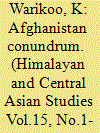

|
|
|
|
|
| Publication |
2011.
|
| Summary/Abstract |
Located at the crossroads of Central, South and West Asia and sharing. its borders with Central Asian Republics of Tajikistan, Uzbekistan and Turkmenistan on the north, Chinese province of Xinjiang in the east, [ran on the west and south west, and Pakistan and Pak-occu pied Kashmir on the south and south east, Afghanistan occupies a unique geo-strategic placement in the region. Distinct ethno-linguistic groups settled in different parts of .»'\fghanistan have diverse social moorings and political affiliations and aspirations. Th us the 'I'ajil
|
|
|
|
|
|
|
|
|
|
|
|
|
|
|
|
| 2 |
ID:
090577


|
|
|
|
|
| Publication |
2009.
|
| Summary/Abstract |
Drawing on field research conducted between 2002 and 2008, including interviews with leading Turkmen 'court' artists and sculptors, personal observation of official events, and analysis of regime texts, this essay seeks to explore the intersections between official history, commemorative strategy, community memory, public sculpture and geopolitics in post-Soviet Turkmenistan. An illuminating example of this interplay is the commemoration and symbolisation of the Great Patriotic War, which has presented a complex challenge to authorised renditions of Turkmen identity, requiring the country's post-Soviet elites to devise new strategies, symbols and vocabularies to direct and accommodate, somewhat ineffectually, popular remembrance practices and the fleeting public visibility of the country's ethnic Russian minority.
|
|
|
|
|
|
|
|
|
|
|
|
|
|
|
|
| 3 |
ID:
138246


|
|
|
|
|
| Summary/Abstract |
The Battle of Gökdepe (1881) is considered to be a turning point in Turkmenistan’s contemporary historiography. It led to the then independent Turkmen (Akhal Tekke in this case) tribes coming under Russian control. Almost immediately after the event the battle became a controversial point of interpretation starting from Turkmen sources (rarely known to us), an immense number of Russian (mostly military) sources, up to the Soviet historians. The post-Soviet official Turkmen historiography of the event came from these foundations, but used its own mythological approach. As a result, the contemporary narrative of the Gökdepe defeat turned into a victory for the Akhal Tekke (and broadly Turkmen) nation. Additionally, this paper argues that the first and partly the second presidents of Turkmenistan incorporated the battle into their own personality cults, a fact which is still specific to the Central Asian context, albeit not unique in world history. In particular, the first president usurped the myth and connected it with his own historical narrative. The second president continues this in the frames of the already settled political culture in the country, adapting the Gökdepe myth to create his own ideological story. Therefore, the appropriation of the historical event in Turkmenistan represents a specific (albeit not unique) case of this kind and shows the way of thinking about the leader in current Turkmenistan.
|
|
|
|
|
|
|
|
|
|
|
|
|
|
|
|
| 4 |
ID:
091405
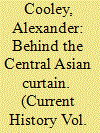

|
|
|
|
|
| Publication |
2009.
|
| Summary/Abstract |
Recent events have made Moscow's attempts to preserve its exclusive regional control seem no longer feasible or cost-effective.
|
|
|
|
|
|
|
|
|
|
|
|
|
|
|
|
| 5 |
ID:
143350
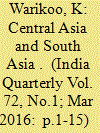

|
|
|
|
|
| Summary/Abstract |
India and Central Asia have shared a geo-cultural affinity and a long tradition of historical contacts that dates back to antiquity. There is convergence of views and interests between the Central Asian Republics and India, on fundamental issues such as; (a) need to maintain social harmony and equilibrium by promoting inter-ethnic harmony and peaceful co-existence; (b) commitment to secularism and democracy and opposition to religious fundamentalism; (c) recognition of threat to regional security and stability from trans-border terrorism, arms and drug trafficking, religious extremism and ethnic-religious secessionism; (d) commitment to the principles of territorial integrity of nation states and inviolability of state borders; (e) promoting economic, scientific and cultural cooperation and (f) ensuring peaceful and tranquil neighbourhood in Afghanistan.
The Central Asian Republics, being cautious and wary of dominating influence of the powerful neighbours like Russia and China look towards India as a friend and partner, which does not have any political or territorial ambitions in the region. India is also expected to play a balancing role in the big power games in Central Asia.
|
|
|
|
|
|
|
|
|
|
|
|
|
|
|
|
| 6 |
ID:
056662
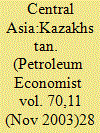

|
|
|
| 7 |
ID:
079545
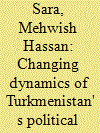

|
|
|
| 8 |
ID:
118781
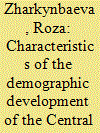

|
|
|
| 9 |
ID:
084955
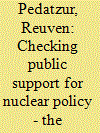

|
|
|
| 10 |
ID:
166795
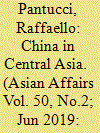

|
|
|
|
|
| Summary/Abstract |
In starting his announcement of the Belt and Road Initiative in Astana, Kazakhstan, President Xi Jinping was very consciously making the point that the broader vision of BRI was something that drew out of an approach that had been long developing between China and Central Asia. Focused on trying to improve prosperity at home through development and prosperity in adjacent regions, China’s relationship with Central Asia was one which provided a model that Xi saw as a positive way to articulate China’s foreign policy more broadly. Consequently, however, China’s relationship with Central Asia provides a useful window into understanding China’s broader Belt and Road Initiative. In the article, the author lays out a short history of China’s relations with Central Asia, illustrates their current status, before offering seven broader lessons and issues to be found which can provide a useful prism through which to consider the longer-term impact of the Belt and Road Initiative around the world.
|
|
|
|
|
|
|
|
|
|
|
|
|
|
|
|
| 11 |
ID:
143219
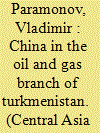

|
|
|
|
|
| Summary/Abstract |
In the 1990s, China showed practically no interest in Turkmen oil and gas. It developed this interest in the middle of the first decade of the twenty-first century and has been widening it ever since. In three years (2006-2009), Beijing built up its presence in Turkmenistan and, after the agreements of September 2013, became an uncontested leader in the Turkmen oil and gas industry.
|
|
|
|
|
|
|
|
|
|
|
|
|
|
|
|
| 12 |
ID:
058196
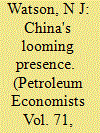

|
|
|
| 13 |
ID:
175069
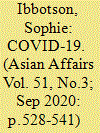

|
|
|
|
|
| Summary/Abstract |
In this article I will discuss three areas: Central Asian countries' immediate responses to the COVID-19 crisis, including the current public health situation; the short- and mid-term economic impact of the global shutdown and slump in oil prices; and what the countries' responses demonstrate about their regimes, relationships, and places in the world today. I will compare and contrast the five countries throughout the article, drawing attention to the most relevant and interesting examples of policy and outcome, with supporting statistics and commentary as relevant. Kazakhstan, Kyrgyzstan, Tajikistan, and Uzbekistan will get the bulk of the analysis, which is a reflection of the difficulty of getting credible information about the COVID-19 situation in Turkmenistan.
|
|
|
|
|
|
|
|
|
|
|
|
|
|
|
|
| 14 |
ID:
076602


|
|
|
| 15 |
ID:
085841
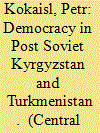

|
|
|
|
|
| Publication |
2008.
|
| Summary/Abstract |
The economic impact of globalization usually draws the most attention, while the accompanying aspects, which may include the transformation of an entire culture, are mentioned only secondarily. However, deeper transformational changes occur in culture and the social structure, which also affects changes in an individual's thinking and reasoning.
|
|
|
|
|
|
|
|
|
|
|
|
|
|
|
|
| 16 |
ID:
070417
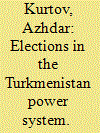

|
|
|
| 17 |
ID:
116318
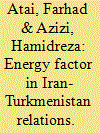

|
|
|
|
|
| Publication |
2012.
|
| Summary/Abstract |
The collapse of the Soviet Union brought about major upheavals in Central Asia and the Caucasus. Among the newly independent states, those that were endowed with energy resources set out on the path of economic growth. The energy resources in Central Asia also attracted outside powers to the region. Moreover, the status of these countries as landlocked, and Russia's monopoly over energy pipelines, led these countries to search for new partners in order to reduce their dependency. This added a new dimension to the political, economic and security equations of the region. In this article, Turkmenistan is studied as a former Soviet republic and Iran as a regional actor that has interests in the region's energy dynamics. The role of energy in the relations between Turkmenistan and Iran is examined. The article proposes that the energy factor has produced a favorable atmosphere for closer relations between the two countries. However, Tehran needs to overcome a number of challenges in expansion of its relations with Turkmenistan, the most important of which is the United States' effective opposition to any Iranian initiative in the field of energy in the region.
|
|
|
|
|
|
|
|
|
|
|
|
|
|
|
|
| 18 |
ID:
066514
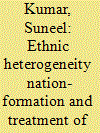

|
|
|
| 19 |
ID:
118742
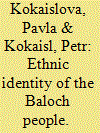

|
|
|
|
|
| Publication |
2012.
|
| Summary/Abstract |
The national self-awareness of the Balochis, who live in several countries and have no statehood, is very specific in many ways. The problem of their identity can be better understood in the context of certain parallels between them and European peoples (ethnic groups), since their ethnogenesis displays certain common features. We should bear in mind, however, that the formation and development of the Balochis differed in many respects from those of the European peoples.
The Balochis of Iran, Afghanistan, Pakistan, and Turkmenistan are not absolutely identical, in this respect they differ greatly from the Europeans.
|
|
|
|
|
|
|
|
|
|
|
|
|
|
|
|
| 20 |
ID:
110787
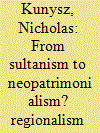

|
|
|
|
|
| Publication |
2012.
|
| Summary/Abstract |
This paper proposes that under President Berdimuhamedov, the government of Turkmenistan has begun to move away from the 'sultanism' of the Niyazov era. Instead, the new government exhibits characteristics and has pursued policy changes that prepare conditions for the further development and entrenchment of localized networks of elites based on kinship. Such changes suggest that the government of Turkmenistan may develop into a more classic neopatrimonial system of authoritarian governance similar to the other post-Soviet republics in Central Asia. This argument is advanced by examining changes between the governments of former President Niyazov and Berdimuhamedov with regard to three areas of the Turkmen state's relationship with its constituent regions: regional composition of the national cabinet; hakim (governor) policy; and regional development. This examination relies largely on a comprehensive survey of online Turkmen state-media sources, as well as numerous supportive secondary sources.
|
|
|
|
|
|
|
|
|
|
|
|
|
|
|
|
|
|
|
|
|